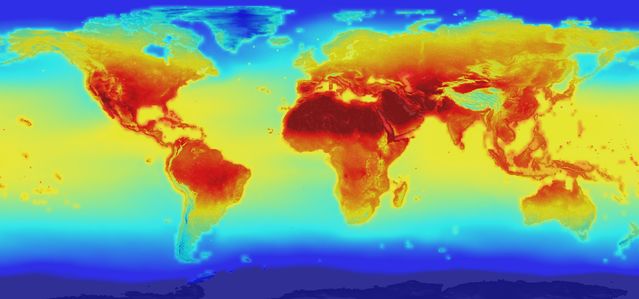Environment
Climate Change: The Conflict Within Us
The conflict over climate change plays out within us as well as between us
Posted January 26, 2019
Most commentators frame the current climate change debate as an epic conflict between political extremes—left and right. There is no denying the politicization of climate change; we hear more about those political fights than we do about possible solutions to the problem. But, perhaps the more basic battle over accepting or rejecting humans’ contribution to global warming may be between clashing tendencies within each of us. Research in behavioral science and neuroscience strongly suggests that impulsivity and self-control constantly compete with one another as organisms struggle to adapt to the short-term and long-term demands of survival.

“It’s a long escalator down to Hell.” So wrote environmentalist Bill McKibben in the November 26, 2018 New Yorker article, entitled “Life on a Shrinking Planet.” His foreboding claim underscores the fact that global climate change is an insidiously gradual process; that very slowness makes its definitive documentation difficult and renders any practical efforts to halt or reverse it appear to be far from urgent.
A century ago, a pair of Nobel lauréates in physiology or medicine—Charles Sherrington and Ivan Pavlov—proposed that organisms could enhance their chances of survival by using external signals to bring them into physical contact with rewarding stimuli or to avoid physical contact with punishing stimuli. These benefits derived from being able to sense external signals with specialized receptors in the eyes, ears, and nose. Sherrington and Pavlov believed that vision, audition, and olfaction were therefore vital to the evolution of the ‘anticipatory’ systems of the brain; that complex organ had now become the organism’s best ‘weapon’ of survival.
Of course, sights, sounds, and smells can be perceived over limited distances. So, the time intervals over which those anticipatory signals can effectively operate are necessarily brief. Being the first to spot a ripe berry or a deadly predator might give an organism only a short-lived interval of time in which to engage in adaptive action. This reality prompts organisms to act impulsively; it is indeed likely that one who hesitates is lost as well as that a bird in the hand is worth two in the bush. However, such impulsivity is obviously at odds with appreciating and contending with the slowly rising warning signs for climate change.
Is there no way out of this predicament? There may well be. But, it rests on being able to anticipate the distant future and to inhibit the urge to respond impulsively: abilities that directly conflict with the basic anticipatory brain mechanisms proposed by Sherrington and Pavlov.
In their 2016 book, Seligman, Railton, Baumeister, and Sripada contended that we humans may be uniquely equipped with still more highly evolved brain mechanisms that enable us to contemplate the distant future and thereby engage in rational behavior to prepare for that future. These authors even dared to propose renaming our species from Homo sapiens to Homo prospectus, because the power of prospection, they believed, is what makes us wise.
Yet, with all that wisdom, why have we so utterly failed to come to grips with climate change and other impending crises such as overpopulation and habitat destruction? Riffing on William Shakespeare, I contend that the fault is not in our stars, but in ourselves. Although we may very well possess more recently evolved brain mechanisms with which to anticipate and prepare for the distant future, even older and more strongly rooted brain systems urge us to succumb to immediate temptations. Put baldly, in the inevitable contest to secure both short-term and long-term outcomes, Homo prospectus may too often act like Homo immediatus.
In order to make more rational choices, we have to appreciate that ‘short-term pain often means long-term gain.’ Strategies for making better choices are available, such as delaying receipt of both the smaller, sooner alternative and the larger, later alternative—a strategy called commitment. Doing so reduces the incidence of impulsive choices in both people and animals.
What about the particular case of climate change? There will certainly be added costs and disruptions if we were immediately to begin the process of modernizing our energy systems. But, the ultimate gains may greatly exceed those initial costs.
Consider an example. Purchasing an electric vehicle means rewiring your garage for 220 VAC and more carefully calculating where and how far you drive each day as well as when and where you recharge your vehicle if you are far away from home. However, those costs and disruptions may be greater if you delay. Extra fuel surcharges, road taxes, and pollution control devices might be required if you continue to drive a gasoline-powered vehicle.
On a worldwide scale, indefinitely delaying the negative impacts of climate change could be outright catastrophic—for ourselves and for all other living beings on the planet. If sea levels continue to rise, habitable areas continue to fall, and the air becomes too toxic to breathe, then we will rue the day that we chose to ignore the unmistakable warning signs.
Rather than further politicizing the climate change debate, perhaps we should reframe it: the fundamental conflict is between small immediate costs and much larger later costs. Let’s live up to the moniker Homo prospectus instead of Homo immediatus and appropriately prepare for the future. Our descendants and those of our planet mates will immeasurably benefit from such wisdom.
References
Sherrington, C. S. (1906). The integrative action of the nervous system. New Haven: Yale University Press.
Pavlov, I. P. (1928/1963). Lectures on conditioned reflexes: Twenty-five years of objective study of the higher nervous activity (behaviour) of animals. New York: International Publishers.
Seligman, M. E. P., Railton, P., Baumeister, R. F., & Sripada, C. (2016). Homo prospectus. New York: Oxford.
Wasserman, E. A. (2019). Precrastination: The fierce urgency of now. Learning and Behavior, 47, 7-28.




